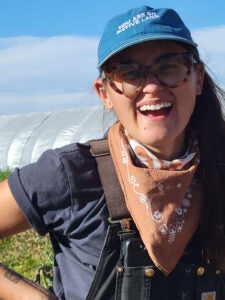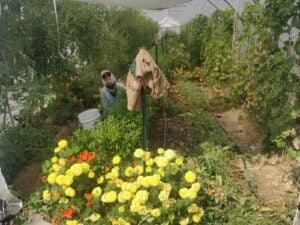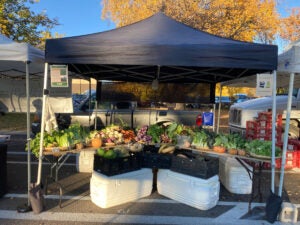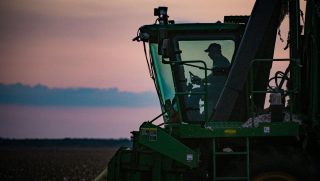Warmer weather ushers in farmers markets, and especially in places like Colorado where the growing season is short and unpredictable, the markets are a welcome sign of the freshness and bounty of a growing season.
One grower, Jade Sato, is working to not only provide fresh food to her community but also to diversify the field in non-traditional ways.
Sato, who is Japanese-American, has a family legacy in agriculture. Sato’s family lost their farm when her grandfather and his entire family was placed in an internment camp during World War II, a result of anti-Japanese sentiment across the U.S. at the time.
Her grandfather never recovered the farm, and her family experienced hostility and discrimination post-war. Searching for a place where they would be welcomed, Sato’s family moved to Colorado, which was one of the few states to publicly support and welcome Japanese-Americans after World War II. Sato’s family established a flower shop, and Sato grew up with mixed feelings about cultivating plants.
“While my family [practiced agriculture], they did it so I wouldn’t have to,” Sato said.

Eventually, Sato felt the pull of being a farmer and wanted to work with the soil. She launched Minoru Farm in Brighton in 2020, named in honor of her grandfather, and grows Asian varieties of vegetables.
Sato’s choice of crop is not random — by growing these Asian vegetables, Sato wants to advocate for and represent the Asian population in Colorado. In a state that is over 85 percent White, Sato knows the importance of representation and having visibility as a minority. She wants to send a message that Asian people are here, and despite some minor confusions over what her crops are at the farmers markets, Sato says that most people have been very welcoming to her in the community.
Part of this welcoming atmosphere is due to the fact that Colorado needs new farmers. Sato described the community of growers along the Front Range, the mountainous range from central Colorado to southern Wyoming, as incredibly diverse. The community varies across ethnicities, sexual orientations, and ages. However, as you move farther into the mountains or toward the plains, the growers there start to look more like “traditional” White, generational farmers.
Sato sees this as an interesting collision of growers, and hopes that a community-centric approach can help bring these growers from such distinct backgrounds together.
“The true farmer who loves food and loves feeding people has passion that overrides ableism, classism, racism, ageism, etc.,” she said. And Sato believes that as long as farmers can see the passion for growing food, it doesn’t matter who they are.

Of course, growing crops in Colorado is in and of itself an incredibly difficult process. With the high altitude and dry air, many crops struggle to thrive. The growing season is short in the state, where snowfall can occur as late as May and as early as September. Spring 2022 was particularly difficult for Sato, who said that the soil was very dry almost the entire time. Then, in August that year, a huge storm came through and destroyed a huge swath of her crop, flooding her field because the soil was so dry it couldn’t absorb the torrent of water that fell.
A mentoring farmer, saddened by her loss, talked about climate change’s impact on weather patterns and how it’ll continue to affect the farming community.
Sato recalls the mentor saying, “You’re coming into farming, and the world is so harsh and it’s so hard. I don’t have any advice to help you with this.”
In addition to unpredictable weather, Sato said land access and water rights are huge barriers for Southwestern farmers. Lots of farmland is being lost to urban development, and with the Southwest running out of water, the future of farming in Colorado is at risk.
“In the West, they say whiskey is for drinking, and water is for fighting, because water is such a precious resource,” Sato said. It’s a painful fact Sato knows too well as she faces many water restrictions for her growing operations.

This is why Sato is so keen on nurturing and supporting different types of farming, stemming from different cultures. She is particularly interested in “survival foods,” or crops that can tolerate harsh growing seasons. Sato has been surprised by which of her crops thrive in the Colorado climate and hopes to continue exploring what kinds of diverse crops may flourish and be able to be grown in the state.
By growing diverse foods, Sato said she is also learning a lot about herself.
“I cry a lot when I eat some of these vegetables, because I’m realizing what I’m missing out on with these flavors and textures, and it’s so healing,” she said.
As Colorado’s climate and water usage continues to change, so too will the farmers in the state, and the diversity of crops being grown. Sato’s choices to grow unconventional crops is one innovative way to combat the unpredictable weather while diversifying and enriching the agricultural sector in Colorado.
Liza Thuy Nguyen serves as the 2023 American Farmland Trust Agriculture Communications Intern at AGDAILY, with a focus on helping to amplify diversity and minority voices in agriculture. Liza is originally from Anaheim, California, and attended the University of California, Davis, as a first-generation college student. She received a bachelor’s degree in genetics and genomics and went on to earn a master’s in horticulture from Penn State.



